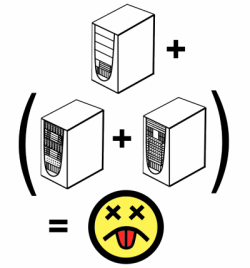Classic WTF: What's in a Name?
by Alex Papadimoulis
in Best of…
on 2024-07-09
We continue our summer break. Sometimes, you need to make a bad choice in your design, and you can often "fix" that, with documentation. "Don't touch the sharp pointy bit." But, not to spoil the ending, sometimes the documentation raises more questions than it answers. Original. --Remy
 The year was 1993, and that meant one thing: Old Iron was finally ready for
The year was 1993, and that meant one thing: Old Iron was finally ready for the scrap yard retirement after nearly fifteen years of faithful service to the university. Technically, the MVS-based mainframe had been well past its prime for quite a many years, but since it was used primarily as a data repository for research projects, no one seemed to mind. But what they would mind, however, was any sort of downtime in the transition to the new, UNIX -based research computer, so it was up to Todd M. Lewis to figure out how to ensure things went smoothly.
In order to give researches the opportunity to learn their way around Unix and adjust their processes for the new environment without disrupting ongoing work on Old Iron, Todd set up a migration process that would pull MVS data sets from the backup system (as not to interfere with “live” data sets users may be using) and copy them to an archive on the UNIX server. From there, users could check out copies from this archive and work with them under UNIX to hone their processes. If they screwed up the data, they could just check it out again from the archive.
 It was a little past 4AM when Massimo's support pager went off, jarring him awake. Without even looking at the pager or logging into his laptop, he flipped on the television to Channel 242: the Video on Demand channel for the Italian TV broadcaster that he worked for.
It was a little past 4AM when Massimo's support pager went off, jarring him awake. Without even looking at the pager or logging into his laptop, he flipped on the television to Channel 242: the Video on Demand channel for the Italian TV broadcaster that he worked for.
 Jun 24
Jun 24 The year was 1993, and that meant one thing: Old Iron was finally ready for
The year was 1993, and that meant one thing: Old Iron was finally ready for 